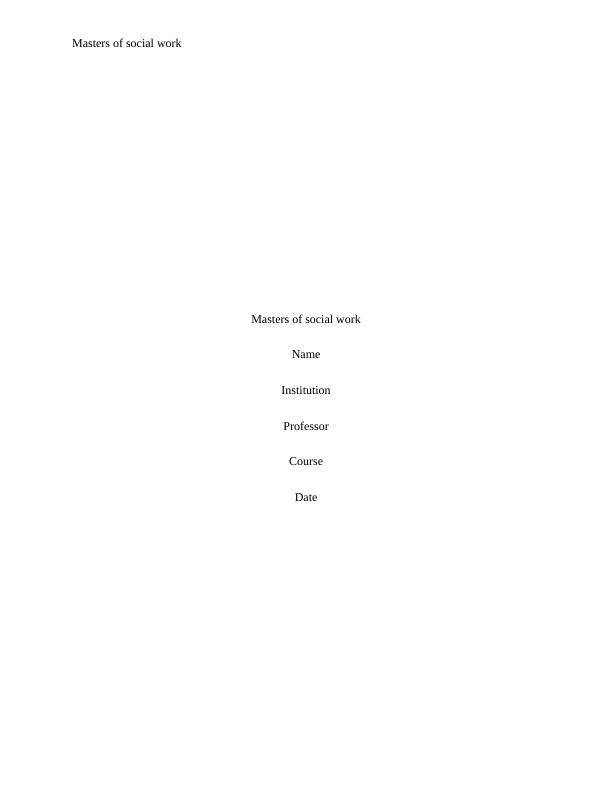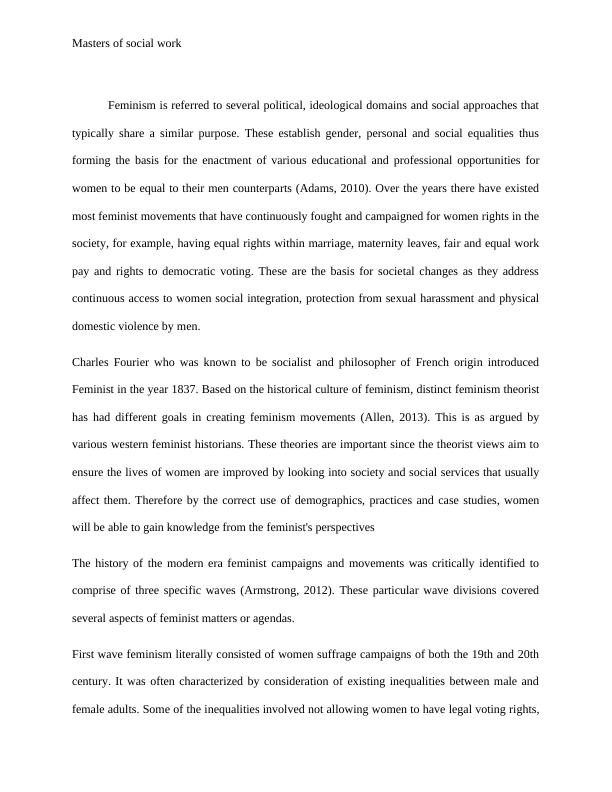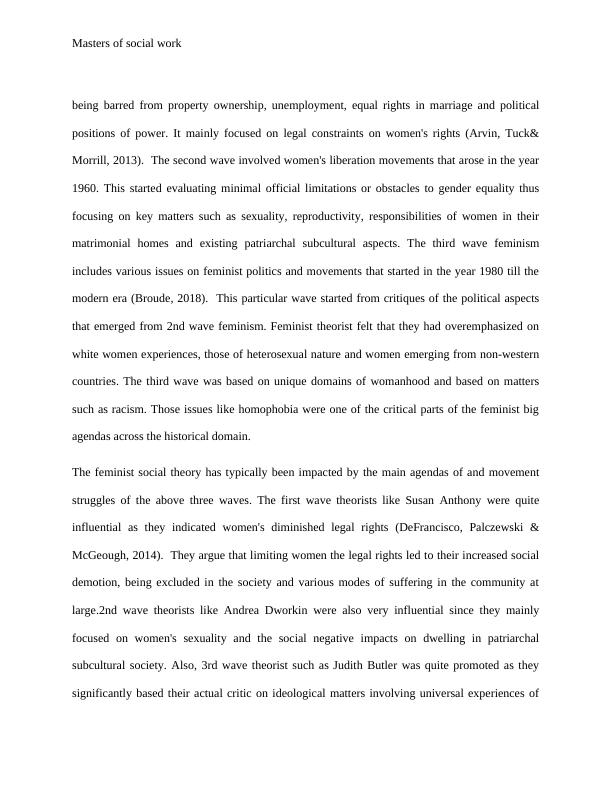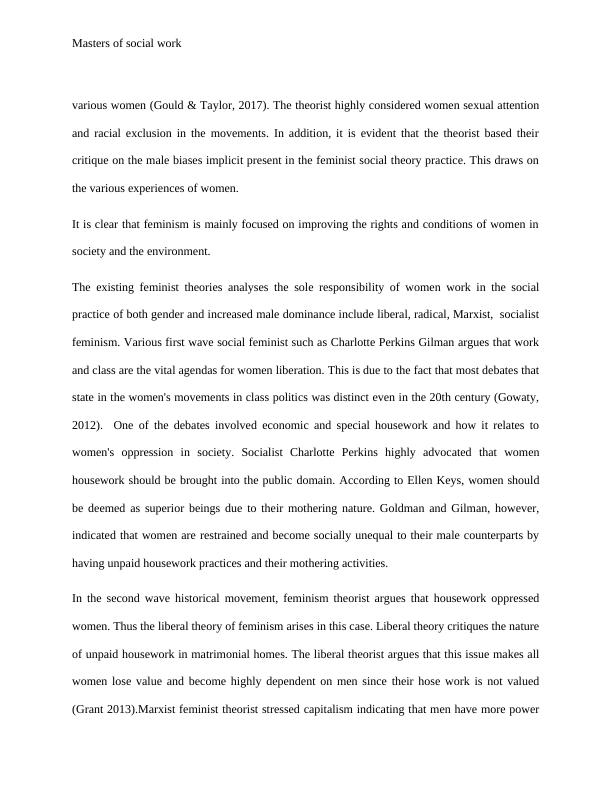Feminist Social Theory and its Impact on Social Work Practice
Added on 2023-06-03
15 Pages4160 Words473 Views
Masters of social work
Masters of social work
Name
Institution
Professor
Course
Date
Masters of social work
Name
Institution
Professor
Course
Date

Masters of social work
Feminism is referred to several political, ideological domains and social approaches that
typically share a similar purpose. These establish gender, personal and social equalities thus
forming the basis for the enactment of various educational and professional opportunities for
women to be equal to their men counterparts (Adams, 2010). Over the years there have existed
most feminist movements that have continuously fought and campaigned for women rights in the
society, for example, having equal rights within marriage, maternity leaves, fair and equal work
pay and rights to democratic voting. These are the basis for societal changes as they address
continuous access to women social integration, protection from sexual harassment and physical
domestic violence by men.
Charles Fourier who was known to be socialist and philosopher of French origin introduced
Feminist in the year 1837. Based on the historical culture of feminism, distinct feminism theorist
has had different goals in creating feminism movements (Allen, 2013). This is as argued by
various western feminist historians. These theories are important since the theorist views aim to
ensure the lives of women are improved by looking into society and social services that usually
affect them. Therefore by the correct use of demographics, practices and case studies, women
will be able to gain knowledge from the feminist's perspectives
The history of the modern era feminist campaigns and movements was critically identified to
comprise of three specific waves (Armstrong, 2012). These particular wave divisions covered
several aspects of feminist matters or agendas.
First wave feminism literally consisted of women suffrage campaigns of both the 19th and 20th
century. It was often characterized by consideration of existing inequalities between male and
female adults. Some of the inequalities involved not allowing women to have legal voting rights,
Feminism is referred to several political, ideological domains and social approaches that
typically share a similar purpose. These establish gender, personal and social equalities thus
forming the basis for the enactment of various educational and professional opportunities for
women to be equal to their men counterparts (Adams, 2010). Over the years there have existed
most feminist movements that have continuously fought and campaigned for women rights in the
society, for example, having equal rights within marriage, maternity leaves, fair and equal work
pay and rights to democratic voting. These are the basis for societal changes as they address
continuous access to women social integration, protection from sexual harassment and physical
domestic violence by men.
Charles Fourier who was known to be socialist and philosopher of French origin introduced
Feminist in the year 1837. Based on the historical culture of feminism, distinct feminism theorist
has had different goals in creating feminism movements (Allen, 2013). This is as argued by
various western feminist historians. These theories are important since the theorist views aim to
ensure the lives of women are improved by looking into society and social services that usually
affect them. Therefore by the correct use of demographics, practices and case studies, women
will be able to gain knowledge from the feminist's perspectives
The history of the modern era feminist campaigns and movements was critically identified to
comprise of three specific waves (Armstrong, 2012). These particular wave divisions covered
several aspects of feminist matters or agendas.
First wave feminism literally consisted of women suffrage campaigns of both the 19th and 20th
century. It was often characterized by consideration of existing inequalities between male and
female adults. Some of the inequalities involved not allowing women to have legal voting rights,

Masters of social work
being barred from property ownership, unemployment, equal rights in marriage and political
positions of power. It mainly focused on legal constraints on women's rights (Arvin, Tuck&
Morrill, 2013). The second wave involved women's liberation movements that arose in the year
1960. This started evaluating minimal official limitations or obstacles to gender equality thus
focusing on key matters such as sexuality, reproductivity, responsibilities of women in their
matrimonial homes and existing patriarchal subcultural aspects. The third wave feminism
includes various issues on feminist politics and movements that started in the year 1980 till the
modern era (Broude, 2018). This particular wave started from critiques of the political aspects
that emerged from 2nd wave feminism. Feminist theorist felt that they had overemphasized on
white women experiences, those of heterosexual nature and women emerging from non-western
countries. The third wave was based on unique domains of womanhood and based on matters
such as racism. Those issues like homophobia were one of the critical parts of the feminist big
agendas across the historical domain.
The feminist social theory has typically been impacted by the main agendas of and movement
struggles of the above three waves. The first wave theorists like Susan Anthony were quite
influential as they indicated women's diminished legal rights (DeFrancisco, Palczewski &
McGeough, 2014). They argue that limiting women the legal rights led to their increased social
demotion, being excluded in the society and various modes of suffering in the community at
large.2nd wave theorists like Andrea Dworkin were also very influential since they mainly
focused on women's sexuality and the social negative impacts on dwelling in patriarchal
subcultural society. Also, 3rd wave theorist such as Judith Butler was quite promoted as they
significantly based their actual critic on ideological matters involving universal experiences of
being barred from property ownership, unemployment, equal rights in marriage and political
positions of power. It mainly focused on legal constraints on women's rights (Arvin, Tuck&
Morrill, 2013). The second wave involved women's liberation movements that arose in the year
1960. This started evaluating minimal official limitations or obstacles to gender equality thus
focusing on key matters such as sexuality, reproductivity, responsibilities of women in their
matrimonial homes and existing patriarchal subcultural aspects. The third wave feminism
includes various issues on feminist politics and movements that started in the year 1980 till the
modern era (Broude, 2018). This particular wave started from critiques of the political aspects
that emerged from 2nd wave feminism. Feminist theorist felt that they had overemphasized on
white women experiences, those of heterosexual nature and women emerging from non-western
countries. The third wave was based on unique domains of womanhood and based on matters
such as racism. Those issues like homophobia were one of the critical parts of the feminist big
agendas across the historical domain.
The feminist social theory has typically been impacted by the main agendas of and movement
struggles of the above three waves. The first wave theorists like Susan Anthony were quite
influential as they indicated women's diminished legal rights (DeFrancisco, Palczewski &
McGeough, 2014). They argue that limiting women the legal rights led to their increased social
demotion, being excluded in the society and various modes of suffering in the community at
large.2nd wave theorists like Andrea Dworkin were also very influential since they mainly
focused on women's sexuality and the social negative impacts on dwelling in patriarchal
subcultural society. Also, 3rd wave theorist such as Judith Butler was quite promoted as they
significantly based their actual critic on ideological matters involving universal experiences of

Masters of social work
various women (Gould & Taylor, 2017). The theorist highly considered women sexual attention
and racial exclusion in the movements. In addition, it is evident that the theorist based their
critique on the male biases implicit present in the feminist social theory practice. This draws on
the various experiences of women.
It is clear that feminism is mainly focused on improving the rights and conditions of women in
society and the environment.
The existing feminist theories analyses the sole responsibility of women work in the social
practice of both gender and increased male dominance include liberal, radical, Marxist, socialist
feminism. Various first wave social feminist such as Charlotte Perkins Gilman argues that work
and class are the vital agendas for women liberation. This is due to the fact that most debates that
state in the women's movements in class politics was distinct even in the 20th century (Gowaty,
2012). One of the debates involved economic and special housework and how it relates to
women's oppression in society. Socialist Charlotte Perkins highly advocated that women
housework should be brought into the public domain. According to Ellen Keys, women should
be deemed as superior beings due to their mothering nature. Goldman and Gilman, however,
indicated that women are restrained and become socially unequal to their male counterparts by
having unpaid housework practices and their mothering activities.
In the second wave historical movement, feminism theorist argues that housework oppressed
women. Thus the liberal theory of feminism arises in this case. Liberal theory critiques the nature
of unpaid housework in matrimonial homes. The liberal theorist argues that this issue makes all
women lose value and become highly dependent on men since their hose work is not valued
(Grant 2013).Marxist feminist theorist stressed capitalism indicating that men have more power
various women (Gould & Taylor, 2017). The theorist highly considered women sexual attention
and racial exclusion in the movements. In addition, it is evident that the theorist based their
critique on the male biases implicit present in the feminist social theory practice. This draws on
the various experiences of women.
It is clear that feminism is mainly focused on improving the rights and conditions of women in
society and the environment.
The existing feminist theories analyses the sole responsibility of women work in the social
practice of both gender and increased male dominance include liberal, radical, Marxist, socialist
feminism. Various first wave social feminist such as Charlotte Perkins Gilman argues that work
and class are the vital agendas for women liberation. This is due to the fact that most debates that
state in the women's movements in class politics was distinct even in the 20th century (Gowaty,
2012). One of the debates involved economic and special housework and how it relates to
women's oppression in society. Socialist Charlotte Perkins highly advocated that women
housework should be brought into the public domain. According to Ellen Keys, women should
be deemed as superior beings due to their mothering nature. Goldman and Gilman, however,
indicated that women are restrained and become socially unequal to their male counterparts by
having unpaid housework practices and their mothering activities.
In the second wave historical movement, feminism theorist argues that housework oppressed
women. Thus the liberal theory of feminism arises in this case. Liberal theory critiques the nature
of unpaid housework in matrimonial homes. The liberal theorist argues that this issue makes all
women lose value and become highly dependent on men since their hose work is not valued
(Grant 2013).Marxist feminist theorist stressed capitalism indicating that men have more power

End of preview
Want to access all the pages? Upload your documents or become a member.
Related Documents
Exploring Feminism in the Film Pretty Womanlg...
|9
|2179
|20
Women and Gender Studies Assignment 2022lg...
|6
|1384
|24
Feminism Europe Essay 2022lg...
|7
|1746
|16
Feminist Social Work Theory and Practicelg...
|17
|4455
|485
Development and Empowerment of Feminism in West, Middle East, and Asialg...
|6
|1744
|454
(Solved) Feminist Theory - PDFlg...
|11
|3871
|222
